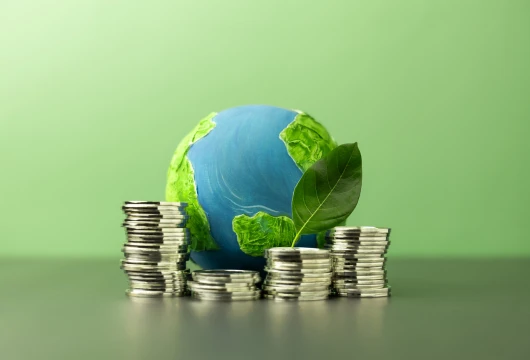With climate change becoming a defining issue of our time, sustainable living is no longer a luxury—it’s a necessity. Consumers and governments alike are demanding eco-friendly alternatives, and this shift in mindset is creating tremendous opportunities for green entrepreneurs. Starting a business that aligns profit with purpose has never been more important. If you’re someone who wants to make an impact while earning an income, here are 10 green business ideas that are easy to start, affordable, and scalable.
1. Eco-Friendly Packaging Solutions
Why It Matters
Plastic pollution is a global crisis. According to UNEP, over 400 million tonnes of plastic waste are produced every year. The demand for compostable, biodegradable, and reusable packaging is growing rapidly.
How To Start
- Partner with local manufacturers to source sustainable materials like cornstarch, jute, or paper.
- Target small businesses that need packaging for food, beauty, or e-commerce products.
- Offer custom branding services to increase value.
Indian Example
Brands like Ecoware and Pappco are already creating compostable tableware from sugarcane bagasse and wheat husk.
2. Organic Farming or Hydroponics
Why It Matters
Sustainable farming methods help preserve biodiversity and soil health. Hydroponics, in particular, uses 90% less water and can be done in urban spaces.
How To Start
- Start with a rooftop garden or small greenhouse.
- Focus on fast-growing crops like lettuce, herbs, or microgreens.
- Sell to local markets, restaurants, or through subscription models.
Resources
- Check out Krishi Jagran and ICAR for free guides and grants.
3. Recycled Paper Stationery
Why It Matters
Paper waste makes up around 26% of total waste at landfills. Using recycled paper reduces deforestation and water usage.
How To Start
- Set up a small workshop with paper recycling machines.
- Design and sell eco-notebooks, planners, wedding cards, etc.
- Collaborate with artists and designers.
Tools & Support
4. Second-Hand Furniture or Clothing Business
- NSIC and MSME support recycled paper units in India.
Why It Matters
The fast fashion and furniture industry is resource-intensive. Extending the lifecycle of products can cut emissions by half.
How To Start
- Source products from donation drives or local vendors.
- Refurbish or upcycle for resale.
- Use online platforms like Instagram or Etsy.
Indian Example
Platforms like Refash and Spoyl focus on curated second-hand fashion.
5. Solar Panel Installation and Maintenance
Why It Matters
India aims to reach 500 GW of renewable energy capacity by 2030. Solar is key to this goal.
How To Start
- Get trained in solar installation (NIWE offers certification).
- Partner with housing societies and small businesses.
- Offer AMC (Annual Maintenance Contracts) for recurring revenue.
Resources
- PM-KUSUM Scheme, MNRE Subsidies
6. Natural Personal Care Products
Why It Matters
Consumers are increasingly ditching chemical-laden cosmetics. Ayurveda and plant-based formulations are gaining global appeal.
How To Start
- Use ingredients like neem, turmeric, aloe vera.
- Start with 3-5 SKUs: face packs, oils, soaps.
- Focus on ethical sourcing and zero-waste packaging.
Indian Example
Brands like Juicy Chemistry started small and now export globally.
7. Sustainable Event Planning
Why It Matters
Events generate a huge carbon footprint. From single-use decorations to plastic cutlery, there’s a massive scope for improvement.
How To Start
- Promote zero-waste weddings, green corporate events.
- Partner with local caterers, florists, and decorators.
- Offer carbon footprint reporting and offsetting options.
Toolkit
- Use online carbon calculators and sustainable event guides.
8. E-Waste Collection & Management
Why It Matters
India is the third-largest e-waste generator in the world. Only 10% of e-waste is formally collected.
How To Start
- Get registered as a formal recycler.
- Collect e-waste from homes, offices, schools.
- Partner with certified recyclers for disposal.
Indian Example
Startups like Karo Sambhav and Hulladek are leading e-waste recycling efforts.
9. Green Content Creation
Why It Matters
Storytelling is a powerful tool to inspire climate action. Green influencers and content creators can shape public opinion.
How To Start
- Start a blog, podcast, or YouTube channel.
- Share DIYs, brand reviews, sustainable living tips.
- Monetize through sponsorships or affiliate marketing.
Inspiration
Check out influencers like TrashIsForTossers and Conscious Chokri.
10. Eco-Tourism and Nature-Based Experiences
Why It Matters
Tourism contributes to 8% of global emissions. Eco-tourism promotes cultural preservation and environmental conservation.
How To Start
- Partner with local communities for guided nature trails.
- Focus on experiential stays, forest retreats, and village homestays.
- Promote through travel blogs and social media.
Indian Example
Grassroutes and NotOnMap curate authentic rural travel experiences.
Green businesses are not only profitable but also help solve some of the most pressing problems of our time. With low capital and high impact, these ideas provide a meaningful starting point for India’s budding eco-entrepreneurs.
Whether you’re an urban millennial, a college student, or a retiree looking for a purpose-driven venture—the green economy is open to all.
For more inspiring Blogs, click here

